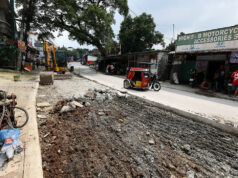ENVIRONMENT protection group Oceana Philippines said that it detected illegal fishing activity in the Visayan Sea during the three-month closed fishing season between November and February.
According to Oceana Philippines, it deployed a Visible Infrared Imaging Radiometer Suite (VIIRS) system which detected such activity in the municipalities of Carles, Concepcion, Barotac Viejo, and Aruy, and Cadiz City, Negros Occidental; and in Madridejos and Bantayan in Cebu.
The Visayan Sea is encompassed by Masbate in the north and Leyte, Cebu, Negros and Panay to the south.
“We found probable illegal fishing activity in the Visayan Sea during the closed season period based on the data gathered from VIIRS. While their presence decreased, we can see that probable intrusion in the prohibited areas continued in the period of November to February,” Oceana Philippines Vice- President Gloria E. Ramos said in a statement on Wednesday.
Ms. Ramos noted that the Fisheries Administrative Order (FAO) 167-3 is in force annually. The order prohibits catching, killing, selling, or possessing sexually mature, young, fry or larvae of herring, mackerel and sardines.
“VIIRS data is essential for enforcement of fisheries law and the sustainable management of fisheries. These data can be used, apart from the Bureau of Fisheries and Aquatic Resources (BFAR), by the Department of Interior and Local Government (DILG), and local government units (LGUs) to strictly enforce closed season in the fishing grounds in their jurisdiction,” Ms. Ramos said.
“We support the enforcement of seasonal fishery closures. However, the catching of juveniles and the race-to-fish after the closed season are significant threats to the population of sardines. Aside from the closed fishing intervention, we reiterate the need for other measures to address these threats. We need to enforce regulations on gears, such as fine mesh nets that catch juveniles and lie low on the fishing pressure and of course, the much-needed implementation of the vessel monitoring requirement for all commercial fishing vessels from 3.1 gross tonnage and up pursuant to RA 10654 which amended the Fisheries Code in 2015,” Ms. Ramos added.
Meanwhile, BFAR National Director Eduardo B. Gongona said that his agency accepts the blame for the reported cases of illegal fishing, and said that the agency needs help in certain aspects. Mr. Gongona, however, said that Oceana Philippines should have reported the incident while monitoring it, instead of waiting for the end of the closed fishing season.
“We accept our weaknesses and we accept that our capabilities still cannot adjust to the speed of monitoring being implied in the monitored incident. We accept the blame and our shame for not acting immediately because of our capability limitations. Maybe we should be helped in the enforcement aspects,” Mr. Gongona said in a text message on Wednesday.
“If our monitoring friends can monitor that fast, let them report that fast also so that concerned government agencies especially those aligned with environment, maritime and fisheries can act that fast,” Mr. Gongona added.
Ms. Ramos said that Oceana Philippines urges the LGUs to implement the DILG circular to help fishermen to generate more income.
“Beyond the declaration of closed season, we urge the coastal local government units to implement the DILG Circular regulating fisheries activities in municipal waters nationwide and to support the implementation of the Visayan Sea Management Framework, and the National Sardine Management Framework Plan. These management measures will address the depleting fish stocks and help improve the income and livelihood of artisanal fisherfolk, Ms. Ramos said.
Mr. Gongona, on the other hand. said that while there is no appropriated budget yet for government agencies, coordination among different agencies will help improve fish production, without even the need to buy new equipment.
“If we can do the harmonization, we don’t need to buy the gadgets to improve monitoring system and the costly systems. Instead, we can use it [budget] to generate income and employment and for other purposes on poverty alleviation,” Mr. Gongona said.
“This is an eye opener that our response capabilities still need improvement,” according to Mr. Gongona. — Reicelene Joy N. Ignacio



